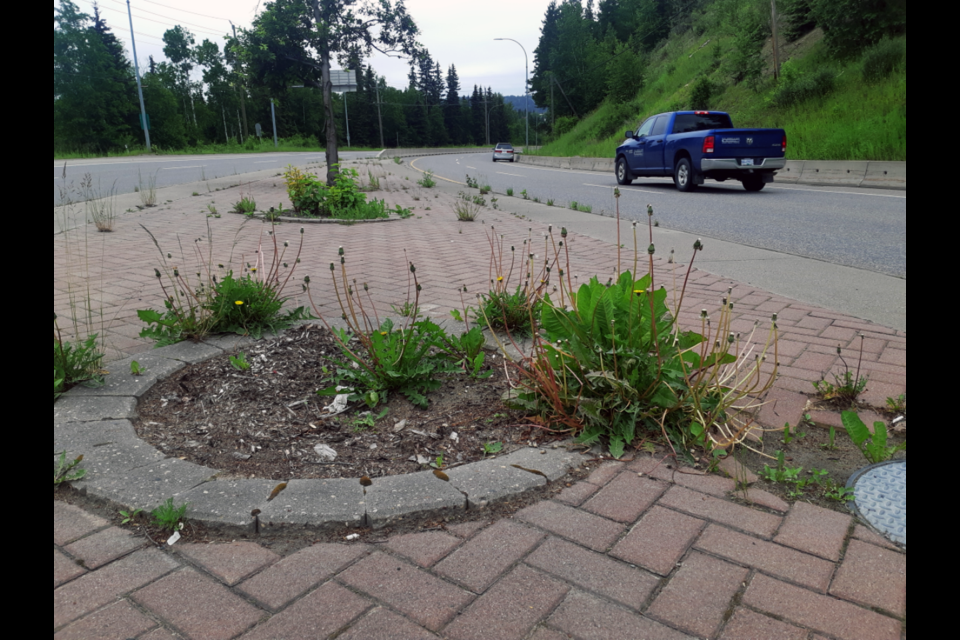Those early-summer downpours were a godsend to plant life that has helped turn Prince George into a green urban jungle.
Unfortunately, some of that lush new growth has taken root in the form of noxious weeds and other invasive plants that have sprouted up in the cracks along highway ditches and boulevards.
Unsightly weeds are taking over in some of the most visible, high-traffic roads, which carry traffic in and out of the city along Highways 16 and 97 and Geoff Eacott thinks it’s a disgrace, giving tourists a bad first impression. Eacott and his wife Patti own and operate Ridgeview Gardens Bed and Breakfast, in the Hart Highlands, and he’s been hearing negative feedback for years from guests who comment about what they see as a lack of care in maintaining the city’s highway entrances.
“Our guests have mentioned it that it’s not a very inviting welcome to Prince George – especially coming in from First Avenue,” said Eacott. “Patti and I have talked about this for years and it’s never changed. It looks good at some times and then they just let it go. There has to be more pride put into it.”
The responsibility for maintaining the ditches and boulevards through the city along Highway 16 and Highway 97 falls on Yellowhead Road and Bridge, which contracts the work through the Ministry of Transportation and Infrastructure to oversee maintenance of the province’s highway coridors.
For YRB, the weed problem is an ongoing battle during the warm-weather months. Litter gets caught in the dandelions, tansy and knapweed that take root in among the brickwork boulevards and tree wells and those same pieces of trash are sometimes left there for weeks.
Terms of the contract require YRB to cut any vegetation that stands taller than 15 centimetres (six inches). Use of herbicides can be harmful to the environment and the use of chemicals in public places is strictly regulated. Some B.C. cities ban chemicals that use glyphosate. YRB Fort George general manager Ben Scott said his company experimented with a foam chemical herbicide two years ago which proved costly and ineffective in controlling weeds.
“Obviously, we can’t spray any chemical, so we end up addressing it by mechanical (means) and we just go and knock it down,” said Scott. “The last couple weeks we’ve had our summer students out there addressing it (using weed/grass trimmers) and we’ve made our way through most of it. It’s probably not the best approach but it seems to be the easiest for us to go and whack the stuff down.
“We’re also looking at more long-term solutions of trying to actually get the roots out of there so it’s not as much of a reoccurring issue. I know the city had some similar issues on some of their boulevards and they had a wire wheel push-behind type thing that physically was more getting into the cracks and ripping the roots out and that seemed to be successful, so we’re looking at options along those lines.”
Scott said the worst trouble spots are along older medians and roadways where large cracks have opened up in the pavement. He and his family live in the city and he also thinks it’s worth making the effort to get rid of the weeds.
“I don’t disagree,” he said. “Obviously you want your hometown to look half-reasonable and sometimes it looks kind of trashy. There are specific areas in the bypass along Central (Avenue) in the contract that we have to maintain that so many times throughout the course of the summer and pick up the gravel but everywhere else it’s not necessarily pinpointed.
“We’re trying to get some support from the ministry of how we can address this long-term, because we’re just going around in circles right now.”
YRB employs eight summer students in the city, two of whom work full-time shifts dedicated exclusively to hand-brushing, traffic control and litter pick-up along the highways.
Eacott thinks YRB should make civic pride more of a priority and he’s hoping for the sake of tourists coming to visit Prince George he will see improvements in the company’s boulevard maintenance practices.
“The city and YRB have got to work together somewhere to do something,” Eacott said. “First Avenue and coming in Central (Highway 97), I think they could do a lot better job maintaining it.
“First impressions, in terms of coming in, it’s not an inviting welcome to town. But once they’re here, their comments are very positive. It’s very friendly and they’re happy.”
First Avenue runs adjacent to the CN Rail tracks and many of the buildings along that section of highway are for light industrial use and occupants of those buildings do little to maintain the exterior of their properties. He points to the Okanagan city of Armstrong, which planted trees, shrubs and park benches on both sides of the railway which bisects the city. He wonders why Prince George can’t do something similar.
Eacott would like to see the city continue to make improvements like the new flower beds built a few years ago along Fifth Avenue and 15th Avenue. He also likes what Quesnel has done with its long rows of flowers planted along Highway 97 to create a more appealing sight for visitors.
“It’s making it look good for tourists,” said Eacott. “Quesnel is a good example.”



